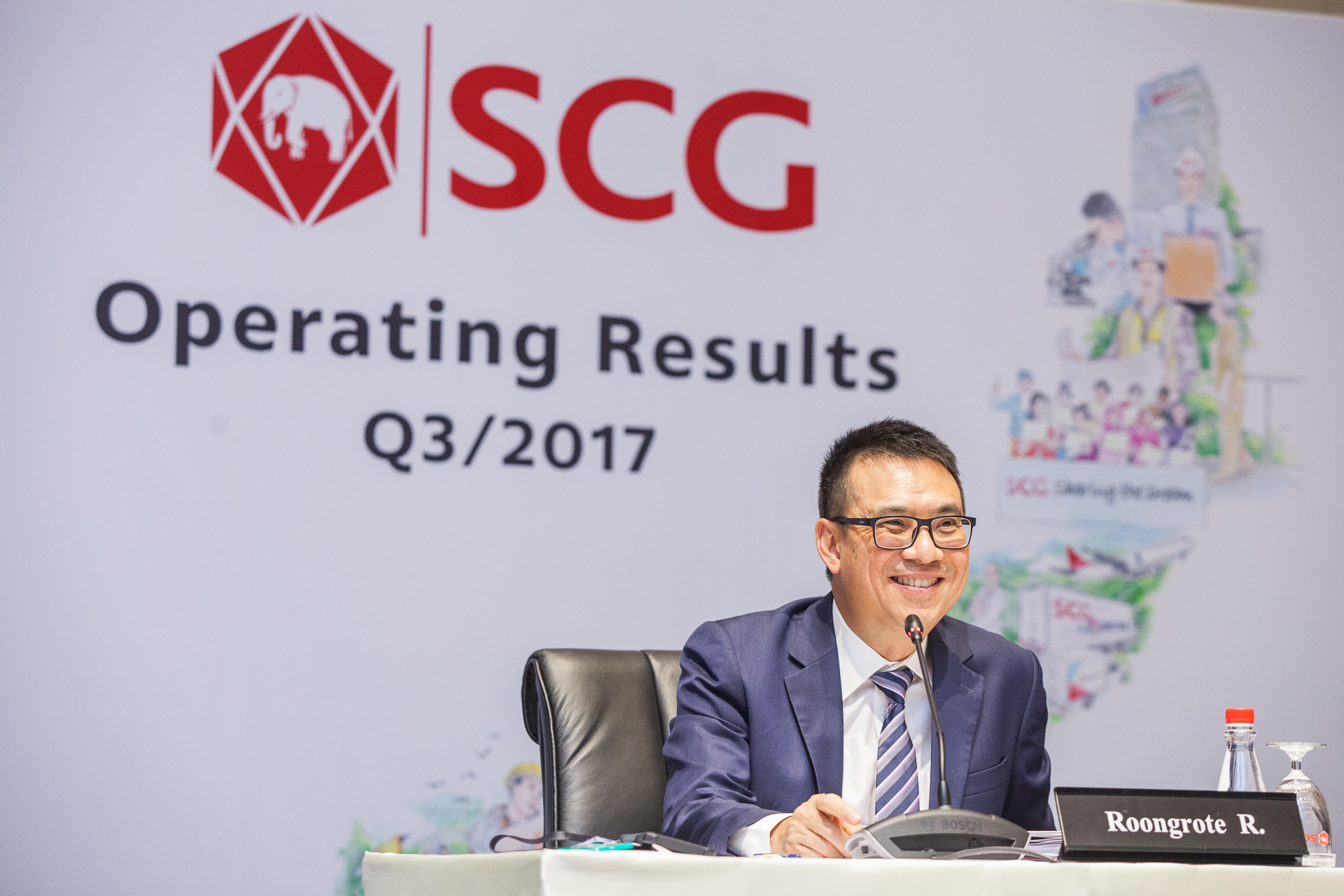SCG to drive innovation and technology in digital age
 |
| Roongrote Rangsiyopash, president and CEO of SCG, disclosed the company’s unaudited operating results for the third quarter of this year |
Roongrote Rangsiyopash, president and CEO of SCG, disclosed the company’s unaudited operating results for the third quarter of 2017. Accordingly, the corporation’s registered revenue from sales increased by 7 per cent on-year to $3.37 billion, up 3 per cent on-quarter, as a result of better sales from all business units.
SCG’s profit for the first nine months was reported at $1.24 billion, a decrease of 3 per cent on-year as a result of strong competition in the Thai cement-building materials business, while revenue from sales increased 4 per cent on-year to $9.85 billion, mostly reflecting higher chemicals prices.
Export revenue accounted for 27 per cent of SCG’s consolidated revenue from sales, representing an increase of 5 per cent on-year to $2.67 million.
Regarding SCG’s operating results in the ASEAN (excluding Thailand), in the third quarter of this year, revenue from sales was registered at $807 million, which is a 10 per cent year-on-year growth and amounts to 24 per cent of SCG’s total sales revenue. This includes sales from both local operations in each ASEAN market and imports from Thai operations.
As of September 30, 2017, SCG had $16.87 billion in total assets, 25 per cent of which are located in the ASEAN (except Thailand).
In Vietnam alone, SCG’s third quarter sales revenue amounted to VND6.88 trillion ($309 million), which represents an increase of 32 per cent on-year coming mainly from the packaging and cement-building materials businesses. For the first nine months of 2017, SCG recorded a sales revenue of VND19.2 trillion ($840 million) in Vietnam.
Roongrote said SCG recently made significant fund of funds investments through its world-class venture capital to promote the sustainable growth of startup ecosystems across the region.
“Moreover, the company continues to drive its business strategy in response to digital transformation and Industry 4.0 by utilising the Internet of Things to continually maximise business efficiency. For example, technology is applied to detecting the amount of cement in silos and connecting logistics networks as well as automatically checking customers’ inventories. Robotics is also utilised in production and maintenance processes, ensuring more convenient, faster, and safer operations. Technology can replace human workforce in risky areas and helps lessen Thailand’s dependency on imported technologies,” he stated.
What the stars mean:
★ Poor ★ ★ Promising ★★★ Good ★★★★ Very good ★★★★★ Exceptional
Latest News
More News
- State corporations poised to drive 2026 growth (February 03, 2026 | 13:58)
- Why high-tech talent will define Vietnam’s growth (February 02, 2026 | 10:47)
- FMCG resilience amid varying storms (February 02, 2026 | 10:00)
- Customs reforms strengthen business confidence, support trade growth (February 01, 2026 | 08:20)
- Vietnam and US to launch sixth trade negotiation round (January 30, 2026 | 15:19)
- Digital publishing emerges as key growth driver in Vietnam (January 30, 2026 | 10:59)
- EVN signs key contract for Tri An hydropower expansion (January 30, 2026 | 10:57)
- Vietnam to lead trade growth in ASEAN (January 29, 2026 | 15:08)
- Carlsberg Vietnam delivers Lunar New Year support in central region (January 28, 2026 | 17:19)
- TikTok penalised $35,000 in Vietnam for consumer protection violations (January 28, 2026 | 17:15)
















 Mobile Version
Mobile Version